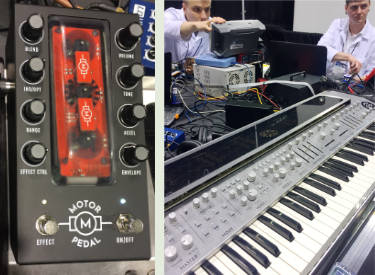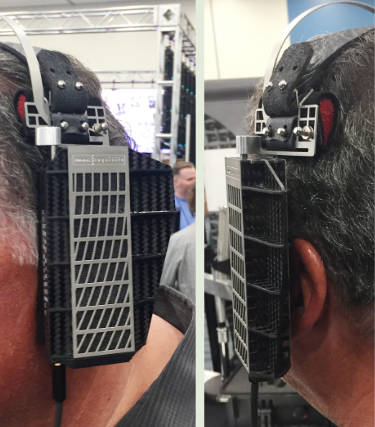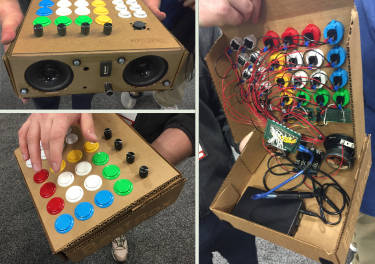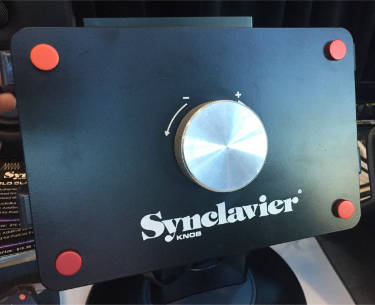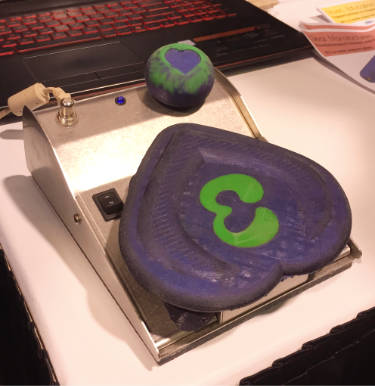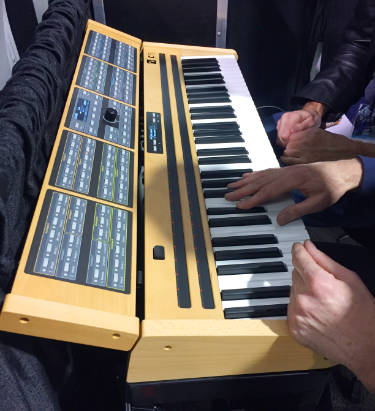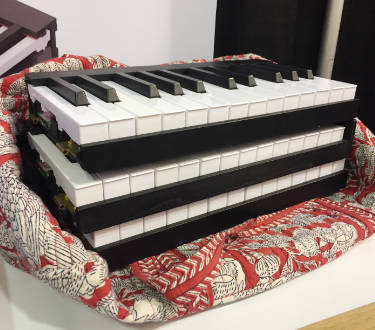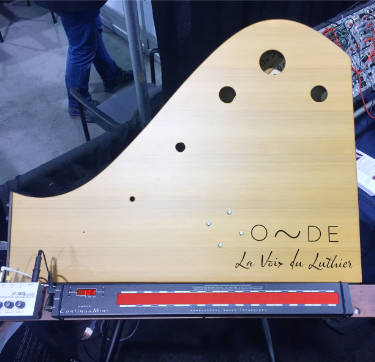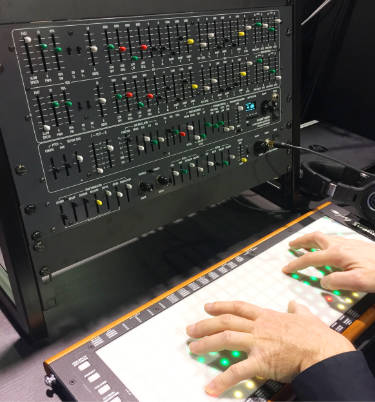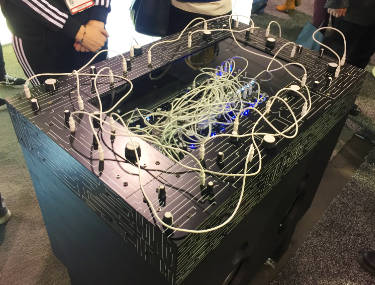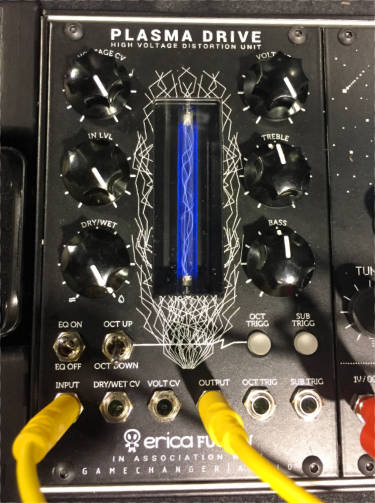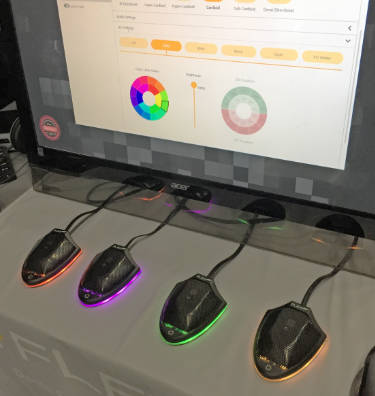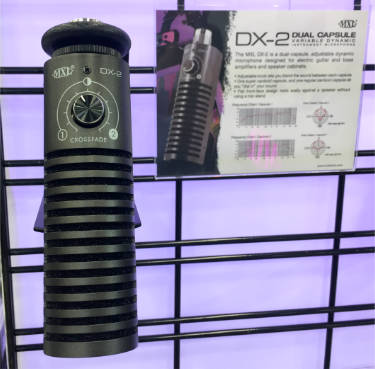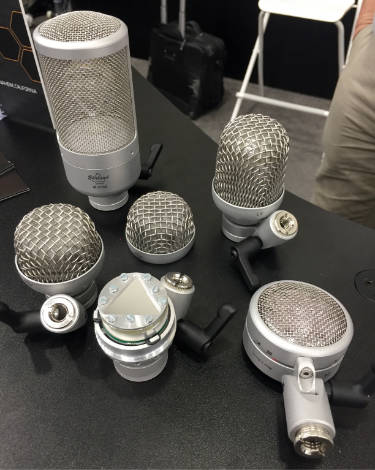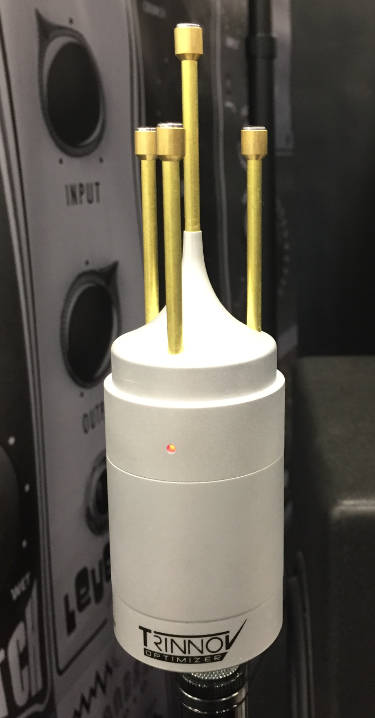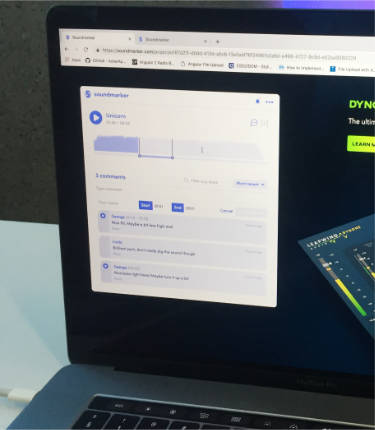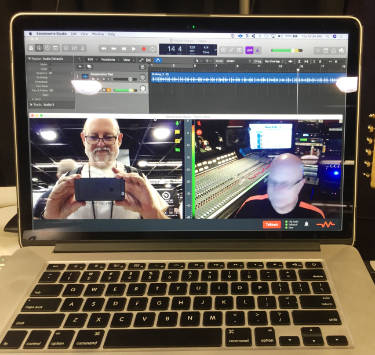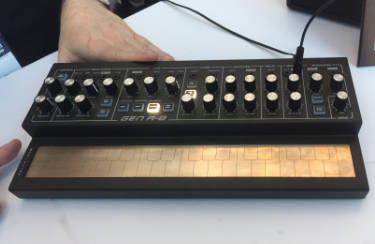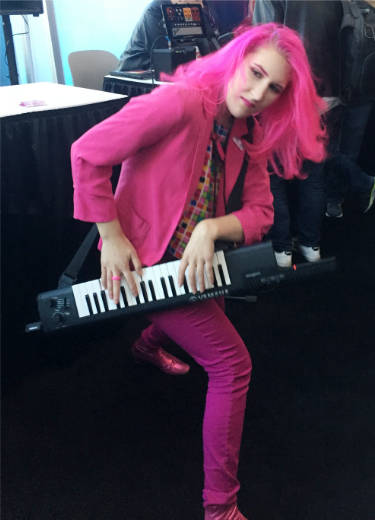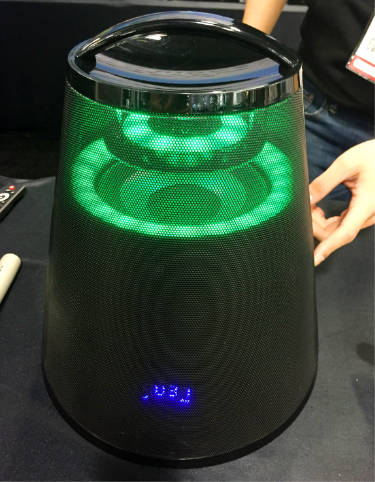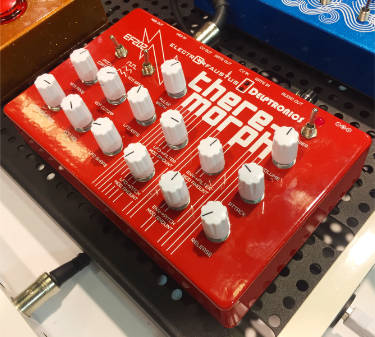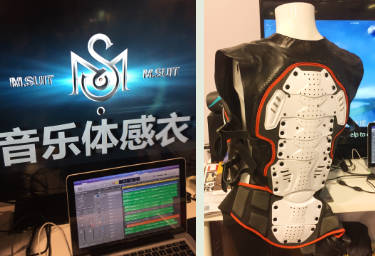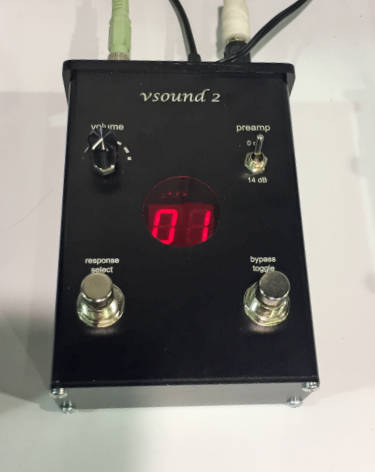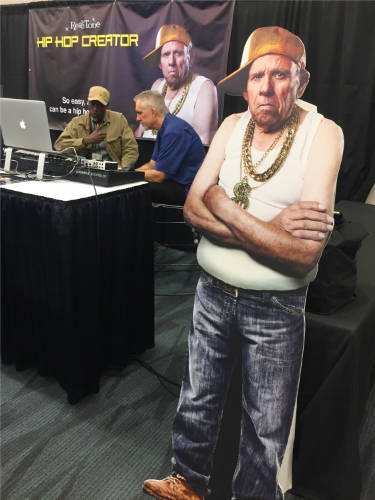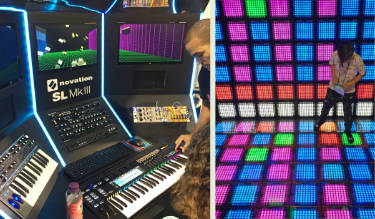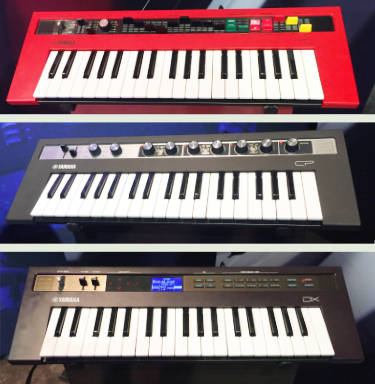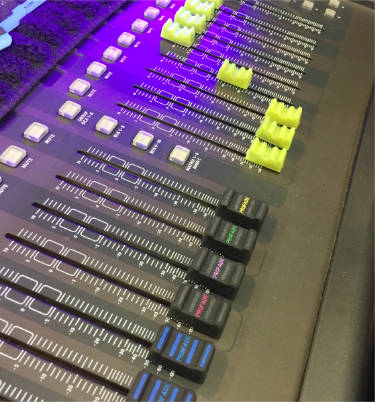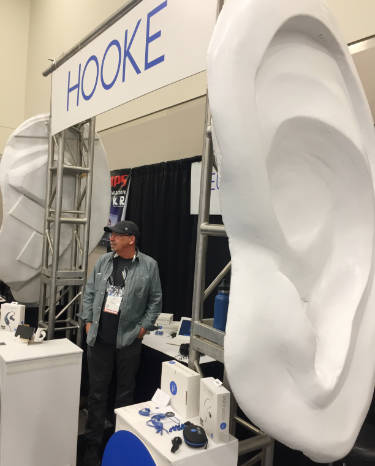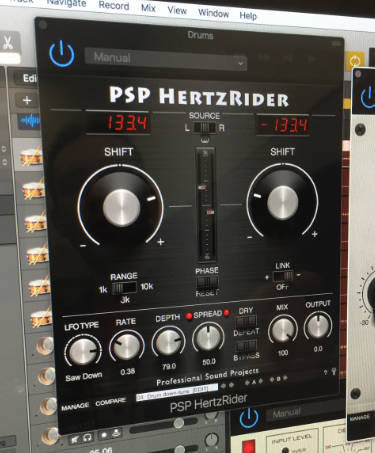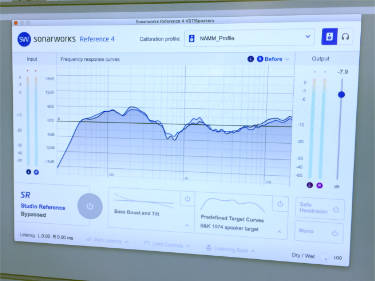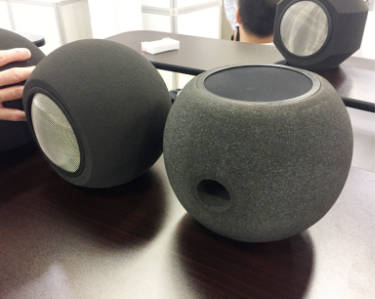Barry Wood's NAMM Oddities 2019 Edition

Techno Geek Toys
Spinnin' Wheel Got To Go 'Round
This is the most unique synth I've seen in some time. It uses spinning discs instead of oscillators and the sound is generated by optical sensors and/or electromagnetic pickups. There are three discs per voice to accomodate different frequency ranges. It's available as a single voice unit, but they were building a multi-voice keyboard prototype right there.
- Gamechanger Audio
- www.gamechangeraudio.com
Head Ribbons
This contraption is a headphone that uses ribbon speaker elements. The ribbons require substantial power so you'll have to use a dedicated power amp to drive them. I thought they sounded quite good but were a little strident in the high frequencies for my tastes.
- RAAL-requisite
- www.raalrequisite.com
A True Beatbox
This eco-friendly kit comes with premium arcade buttons and integrated amplifier and speakers. It's the perfect companion to this cardboard keyboard I saw two years ago.
- Beatbox Instruments
- www.beatboxinstruments.com
One-Trick Pony
Apparently the knob from the classic Synclavier has enough of a following that they can sell the knob on its own for $399.
Four. Hundred. Dollar. Knob.
- Synclavier Digital
- www.synclavier.com
He was Once a Little Green Slab of Clay
The Control Pedal might look like it was designed by Art Clokey, but it's actually a pretty cool multiple axis foot controller. You weren't using your feet for much when you were playing anyway, right?
- Effigy Labs, LLC
- www.effigylabs.com
Go Live or Go Home
The C15 is designed as an expressive perfomance keyboard. They have taken this ethos all the way to the point of not including MIDI in and out in any fashion.
- Nonlinear Labs GmbH
- www.nonlinear-labs.de
Fat Stacks of Keys
The Piano de Voyage is a modular keyboard controller. You buy as many modules as you want. You could have an 88-key controller that fits in a backpack.
- Ryme Music
- www.pianodevoyage.com
Staying Power
I was an instant fan of Haken Audio when I saw the Continuum 15 years ago. Their newest product is the Continuum Fingerboard which incorporates many of the features of the original Continuum in a smaller, more affordable package. They paired their Fingerboard with the La Voix du Luthier acoustic resonators. These are definitely worth investigating.
- Haken Audio
- www.hakenaudio.com
- La Voix du Luthier
- www.la-voix-du-luthier.com
Replicants Are Not Clones
While this sounds substantially like a CS-80, it goes much farther. With an updated architecture, support for polyphonic aftertouch, and MPE support, this is far more than clone.
- Deckard's Dream
- www.deckardsdream.com
Shabu-Shabu Patch Cord Pasta
This was just a trade show attraction, but it did look like what you would have in a collaborative modular patching environment. Contrary to their name, modules from Qu-Bit have nothing to do with quantum computing.
- Qu-Bit
- www.qubitelectronix.com
Pool Float Soundproofing
This is a clever and effective sound isolation product. It's light, modular, compresses for shipping, and is pretty darn effective.
- AirHush ISAT Systems, Inc.
- www.airhush.com
High Voltage Eurorack
Why wouldn't you want a 3,000-volt plasma-based distortion module in your Eurorack? Music isn't supposed to be a safe enterprise.
With this you could become Gene Wilder in "Young Frankenstein."
- Gamechanger Audio
- www.gamechangeraudio.com
One Wire to Rule Them All
These Dante-enabled mics not only pass audio over ethernet, they also get power and all of the controls to set the LED color and mic pickup patterns sent over the same connection. These are ideal mics for an installation.
- Flex AV
- www.flexav.com
Two, Two, Two Mics in One
Like the mints of antiquity, the DX-2 mic is two things at once. It contains both small-diaphragm and a large-diaphragm dynamic transducers and you can dial in the mix between them. Its intended application is recording guitar cabinets without a mic stand by just hanging over the front. The picture here is showing the back of the mic. I may have to pick up one of these.
- MXL
- www.mxlmics.com
Triaphragm
From a physics perspective, it makes sense that a triangular diaphragm would have advantages over a round one. I'd be curious to hear what they sound like in a studio setting.
They really ought to trademark "Triaphragm." I'd take a mic in trade for the use of the term in perpetuity :)
- Ehrlund Microphones
- www.ehrlund.se
We Come in Peace
Trinnov's measurement mic has multiple elements and uses the difference in arrival time of the sound to determine the spatial positions of your surround speakers. Their software can then process the audio to simulate the speakers as if they were in optimal locations.
- Trinnov Audio
- www.trinnov.com
Purpose Built
We've all used Dropbox, Google Drive, and a number of other ways to share work in progress and while they get the job done, none of them are particularly suited for getting feedback. Soundmarker has created a tool for sharing mixes that allows for comments to be attached to specific regions. I've already started using this myself.
- soundmarker
- www.soundmarker.com
Skype But With Good Audio
It's actually got a lot more features than Skype, but prioritizing the audio quality is the killer feature. At the show they had their studio in Vancouver BC connected and the sound quality was great with little perceptible lag.
- Sessionwire Communications Inc.
- www.sessionwire.com
Upping the Ante
Six years ago I was impressed by the Stylophone that Dubreq was showing. This year they introduced the GEN R-8, which with CV and gate output is suitable for integrating into just about any modular synth rig.
- Dubreq Ltd
- www.dubreq.com
Triggered by Colors
This isn't the latest trigger warning you need to be aware of. This is a wireless ring with an optical sensor that reads the color that you tap on.
- Sphero
- www.sphero.com
No Keyboard Skills Required
Plasmic was demoing the Sonogenic SHS-500 keytar from Yamaha. With the included software you load up a song and just bash away at the keys and you'll never hear a wrong note.
- Yamaha
- www.yamaha.com
Appealing to Base Instincts
Honestly, it was the internal lighting that made my lizard brain go "Oooh, pretty!" but this was actually a pretty cool bluetooth speaker. The vertically firing speaker with the diffuser spread the sound nicely.
permalinkJoin the Flail Army
Electro-Faustus isn't known for subtlety in their effects. Don't expect to play "Amazing Grace" on the Theremorph; do expect to make startling noises while waving your hands around in its vicinity.
- Electro-Faustus LLC
- www.electrofaustus.com
Haptic Happening
There wasn't anyone at this booth when I came by, but I was able to suss out that this was as haptic vest that they were showing. There was no literature and my Google-fu isn't turning up any hits, so I can't tell you where to do to find more information. It looks cool, though.
- M.SUIT
Keepin' It Real
Electric violins and pickups on acoustic violins never sound, shall we say, good. I was very impressed with what I heard from the Vsound 2. They've done a great job creating impulse response files from great sounding instruments.
- Signal Wizard Systems, LLC
- www.signalwizardsystems.com
Keepin' it Realitone
Depending on your perspective, this is either a useful production tool or an act of musical commoditization. I suppose the same may have been thought of the Wurlitzer Sideman back in the day. I'm expecting to see the Reggae-Matic from Realitone any day now.
- Realitone
- www.realitone.com
Full Metal Tron
From the disco floor and wall to the multi-screen workstation, there was no expense spared in the launch of the Novation Launchpad XL.
- Focusrite Audio Engineering, Plc
- www.novationmusic.com
Tiny Giants
Yamaha isn't a company prone to producing oddities. In fact, this is the first year they've made an appearance here. That explains why I'm just now noticing these keyboards that were released a few years back. The YC does organ sounds, the CP is electric pianos, and the DX… you can probably figure that one out for yourself. They all actually sound pretty damn good.
- Yamaha
- www.yamaha.com
Where the Rubber Meets the Road
If you feel like your faders are lacking in traction, you can upgrade to these rubber replacements. They even have one model that glows in the dark, for those sessions where the lights are low, i.e. all of them.
- Profade
- www.profader.com
Earworm From Hell
You know, a music hook? Earworm? Big ears? Big worm? Yeah, I didn't think it was all that funny, either.
- Hooke Audio
- www.hookeaudio.com
Maybe Padded Shorts Would Help
Instead of an absolute pitch shift, this tracks the pitch of the input signal and shifts it by a relative amount. This ought to be useful for changing the pitch of things like toms.
- PSP Audioware S.C.
- www.pspaudioware.com
De-Crappify Your Headphones
They've carefully measured hundreds of headphone models and provide EQ curves that do a damn good job of making the headphones sound reasonably accurate.
- Sonarworks
- www.sonarworks.com
Mic Balls
if you need to use your studio mic in an environment that's not as controlled as the typical studio, you might do well to cram it into one of these guys.
- Ningbo Apextone Electronics Co., Ltd.
- www.apextone.com
©2019 Barry Wood
